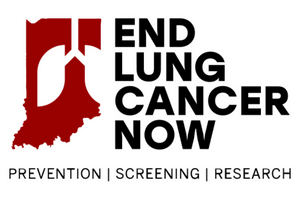November 29, 2022:
By Nasser Hanna, M.D.
Since it’s Lung Cancer Awareness Month, I’d like to tell you about an initiative that we started at the Indiana University Melvin and Bren Simon Comprehensive Cancer. It’s called End Lung Cancer Now, and we recently wrapped up what we called a “gathering.” The event included guest speakers from Roswell Park Comprehensive Cancer Center (Buffalo, N.Y.), St. Elizabeth Healthcare (Edgewood, Ky.), and Baptist Memorial Health Care (Memphis, Tenn.) and nearly 100 people who share the desire to end lung cancer—now.
During the event, people discussed how we can work together to increase access to low-dose CT scans, spread awareness that these screenings are available and effective, as well as decrease the stigma around lung cancer so that there is no longer any guilt or shame around needing a scan. Key focus areas for these discussions included how to incorporate primary care education and engagement, systems-based changes, and community education and advocacy into this action plan.
As you know, we have our work cut out for us as lung cancer is the No. 1 cause of cancer-related death in men and women — by far. Each year, lung cancer kills more people than colorectal, breast, and prostate cancer combined — the second-, third-, and fourth-leading cancer killers.
Yet, it wasn’t that long ago that lung cancer was a rare diagnosis. It was only in the beginning of the second half of the 20th century that people were increasingly diagnosed with the disease because of the dramatic rise in cigarette consumption. During that time, there were few effective therapies for lung cancer and no way to screen for it.
Times have changed. As the result of efforts by advocates and public health officials, cigarette smoking has significantly declined in the past 25 years. In the last decade, screening CT lung scans have proven to reduce the mortality due to lung cancer. Unfortunately, too few eligible people are getting their screening scans. Once again, advocates and public health officials have their work cut out for them.
End Lung Cancer Now seeks to make lung cancer a rare diagnosis again through its mission to:
- Increase participation in lung cancer studies. We can accelerate therapeutic progress by increasing enrollment in clinical studies, as only 5 percent to 10 percent of people with lung cancer participate in research studies. Specifically, our goal is to educate the public about the benefits of research studies by increasing awareness about recent advances, dispelling myths about research studies, and reducing barriers to participation in research studies, especially among under-represented populations.
- Educate and empower advocates to eliminate tobacco use in Indiana. We can reduce the incidence of lung cancer by 90 percent in the next 20 years by dramatically reducing cigarette smoking.
- Screen all eligible patients with chest CT scans. We can reduce lung cancer mortality by 20 percent right now by maximizing screening CT scans. Only 5 percent to 7 percent of all eligible people for lung cancer screening scans are getting them. Through the work of advocates, we plan to change that.
I’m proud that our cancer center recently joined more than 50 organizations in a call to action that urges individuals, providers, and insurers to increase access to and utilization of low-dose CT screening for those at high risk for lung cancer. It’s likely that your organization or cancer center joined this effort as well.
We’re already planning our third “gathering” for next November. But we’re using each day of every month to advocate for clinical study participation, smoking cessation, and increased CT screening uptake as well as supporting those with lung cancer and reducing existing stigmas.
Nasser Hanna, M.D.
Tom and Julie Wood Family Foundation Professor of Lung Cancer Clinical Research
Professor of Medicine
Indiana University School of Medicine
Physician-scientist
Indiana University Melvin and Bren Simon Comprehensive Cancer Center
Founder & Chair
End Lung Cancer Now
About the Big Ten Cancer Research Consortium: The Big Ten cancer centers have united to transform the conduct of cancer research through collaborative, hypothesis-driven, highly translational oncology trials that leverage the scientific and clinical expertise of Big Ten universities. The Big Ten Cancer Research Consortium creates a unique team-research culture to drive science rapidly from ideas to treatment-changing paradigms. Within this innovative environment, today’s research leaders collaborate with and mentor the research leaders of tomorrow with the unified goal of improving the lives of all patients with cancer.
About the Big Ten Conference: The Big Ten Conference is an association of world-class universities whose member institutions share a common mission of research, graduate, professional and undergraduate teaching and public service. Founded in 1896, the Big Ten has sustained a comprehensive set of shared practices and policies that enforce the priority of academics in the lives of students competing in intercollegiate athletics and emphasize the values of integrity, fairness and competitiveness. The broad-based programs of the 14 Big Ten institutions will provide over $200 million in direct financial support to more than 9,800 students for more than 11,000 participation opportunities on 350 teams in 42 different sports. The Big Ten sponsors 28 official conference sports, 14 for men and 14 for women, including the addition of men’s ice hockey and men’s and women’s lacrosse since 2013. For more information, visit www.bigten.org















Subscribe to the Big Ten CRC Newsletter X
X Facebook
Facebook YouTube
YouTube